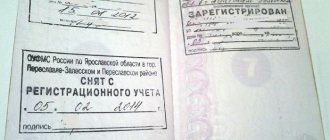Legal requirements
If the apartment is not privatized, can new residents be registered in it? Municipal housing is real estate that has a certain legal status.
In fact, it is the property of local governments .
Citizens are his employers, therefore, their rights are somewhat limited compared to owners of their own real estate.
Unlike registration in your own housing, the registration of which is carried out in accordance with the Civil Code, procedural issues for municipal housing are regulated by Article 70 of the Housing Code.
It is this document that contains the regulations for moving into and registering housing of this status. According to it, the employer cannot register a new tenant without the consent of all adult citizens who are already registered in the given territory.
At the same time, there are conditions under which the tenant may be refused registration for another tenant, if after that the share of each is less than ten square meters of living space.
The Housing Committee separately considers the issue of registering a newborn child or a new family member.
Registration by law in these circumstances involves changing the housing contract and adding new participants to it.
In addition to the residential complex, the registration procedure is regulated by Government Decree No. 713 of June 17, 1995 and Federal Law No. 5242-1. These documents define the procedure for submitting an application and provide a list of those responsible for its preparation.
Conditions for registration
There are several mandatory conditions:
- the housing has the appropriate legal status;
- all documents must be in order;
- there is consent from the owner if he is not the one registering.
The legal status and required documents are discussed separately, but then we will look at ways to record the owner’s consent.
Owner's consent
The most obvious way is to come with him to the place of registration so that he himself expresses his consent. This is not always possible, but in this case there are options that do not imply his direct presence during registration:
- by notarized power of attorney;
- but a notarized statement.
Often, passport office employees are afraid to register a citizen without the direct presence of the homeowner, so it is better to call in advance and clarify whether registration will be possible using one of these methods. Usually the answer is positive, but in passport offices in small towns a negative answer is also possible.
Let us note that the refusal is unlawful, but rather than dealing with the involvement of the prosecutor’s office, it is often easier to ensure that the owner is present.
When using the second option, that is, a statement certified by a notary, it is filled out by the owner and then certified by a notary. This is often practiced if the owner is sick, since a notary can be invited to the house. If the owner of the property is not able to fill out the application himself, but is of sound mind and good memory, it is allowed to fill it out for him by a signer, who also signs, after which it is certified by a notary in the presence of the owner.
Then the application is submitted to the place of registration with the remaining documents on an individual basis, and the standard registration procedure is carried out.
Property owners are sometimes afraid to register tenants, fearing that in the future there may be delays in deregistering them; some are even sure that they will acquire ownership rights and the opportunity to sell part of the house. In fact, there is no need to worry about this, since registration will not give any property rights, it is only a notification measure.
Problems with obtaining consent may arise if the registered person has minor children, and here the fears of the property owner are partly justified: the registered person can (and is even obliged) to register his own child, even without the consent of the owner.
As a result of the special legal status of the child, if the resident who needs to be discharged has children and has also registered them in the home, problems may arise with their discharge. And even if you go to court, the red tape may continue, since you will need to document that there is somewhere to register the child after he is deregistered at his current address.
Who can apply for registration?
Is it possible to register a person in a non-privatized apartment? the consent of those living in it can move in and, accordingly, register in residential premises owned by the municipality . The difference from your own home is only in the restrictions on living space and the procedure for carrying out the procedure.
Who can be registered without the consent of the residents? How can you register in such an apartment if you are not a relative?
If the person registering is a relative of the tenant or any family member living in the area, it is enough for him to obtain the consent of all residents.
Since 2009, registration of relatives does not even require taking into account the area norm . In other words, anyone can register for municipal housing if the employer or members of his family declare that this is their relative.
If the person being registered is the spouse or parent of the responsible tenant, his registration is carried out according to a simplified procedure, without obtaining the permission of the other registered persons. At the same time, the administration makes changes to the social tenancy agreement.
To register an outsider, in addition to the consent of the residents, permission from the local administration that owns the property is required. At the same time, the authorities have the right to refuse if after this the size of the living space for each resident is less than 10 meters.
Where should the document be submitted?
The completed consent, along with the rest of the documentation, must be sent to the territorial body of the Ministry of Internal Affairs, which will process the registration. According to the requirements of the law, this can be done in several ways.
First of all, the documents are transferred personally by the interested party or the owner of the property. This option is the most common and profitable, since a person can personally verify that all the necessary information is not only delivered to the addressee, but also registered and accepted for execution. In this case, errors and inaccuracies can be eliminated on the spot.
Another of the most commonly used methods is electronic transmission. This option involves sending it through the resources of a special portal to the website of the registration authority. To do this, the interested person must have computer equipment at his disposal to translate documentation, including consent, into electronic format.
Postal delivery is also not prohibited by current legislation.
Rights and responsibilities of a new tenant
When deciding to add a new tenant to municipal housing, residents need to take into account that he will acquire equal rights with them.
He, along with other residents, will be able to perform the following actions:
- Moving minor children into an apartment without the permission of those registered.
- Obtain alternative municipal living space in case of emergency, resettlement or exchange.
- Participate in the privatization of living space.
- Move in family members if you receive permission to do so from other employers.
Most often, these circumstances are the reason why some employers disagree with the registration of a new person, because their share in the living space is significantly reduced .
In addition to rights, a new tenant also has a number of responsibilities :
- The new tenant is required to participate in paying for housing and communal services.
- Perform repair and maintenance activities.
For this reason, you can get a refusal from authorities who do not want to register unreliable citizens in their own living space.
For residents, the registration of a new tenant can result in unpleasant consequences if he has loan debts.
By law, bailiffs can arrest and even seize any property in an apartment to pay off a debt. In this case, residents will have to prove that the property belongs to them.
Registration of a minor citizen in the territory of residence of one of the parents is carried out without taking into account the opinions of other residents. Authorization is also not required.
Negative consequences for the owner
The owner must remember that the permanent registration of a stranger or relative in his possessions carries with it some consequences:
- There are no registration deadlines.
- A registered person has the right to register his children and close relatives without the consent of the owner.
- A registered tenant has the right to reside and use the apartment property.
- Without the consent of the tenant, the only way to discharge him is through the court.
- When concluding purchase and sale transactions or exchange of real estate with the people registered in it, difficulties may arise.
The owner of a house without the right of residence must remember that by registering a person in such property, he risks answering before the law and can be punished with fines from 200,000 to 500,000 rubles, forced labor or imprisonment for up to 3 years.
Regulations
To register, you need to go through the following steps:
- Obtain written consent from the landlord if you are not a relative of those living in the apartment.
- Submit an application (Form – 6) to the FMS department on whose territory the apartment is located. In addition to the one being registered, a statement of consent must be written personally by everyone living in the apartment.
- Provide the required package of documents :
- passport;
- departure slip;
- military ID (if available);
- certificate from the administration about family composition;
- rental agreement;
- birth certificate (for a citizen under 14 years of age).
A child over 14 must attend in person.
Where to apply?
Where to apply for registration in a municipal apartment? Depending on the form of management of an apartment building, you need to contact the housing department, homeowners association or other authorities that have a passport office .
If necessary, staff will recommend to you which organization you need to obtain additional certificates or permits for registration.
In addition, you can start the procedure at the MFC or through the State Services portal. To begin with, employees need to provide originals and copies of all of the above documents. The application, together with the applicant for registration, must be submitted personally by everyone registered in the apartment.
If one of those registered is temporarily absent, you will have to wait for his arrival. You can also use a notarized one-time power of attorney or obtain consent from a notary at your place of residence for the time being.
application in any form. At the same time, the address of the property and information about the responsible tenant are accurately indicated.
The stamp in the passport is placed exclusively in the department of the Federal Migration Service . Therefore, after checking the documents, you will be invited to receive documents from this organization.
What information should it contain?
The text of the document must reflect information that relates to the homeowner’s application.
This includes:
- Name of the registration authority to which the document is sent.
- Information about the owner of the property - last name, first name, patronymic in full, residential and email address, contact phone number, series, number and date of issue of passport, date of birth.
- Place of execution of the document.
- Registration address of the owner himself.
- Data of the interested person - last name, first name, patronymic in full, series, passport number, date, month and year of birth.
- Owner's consent.
- The address of the housing where the interested person will be registered.
- Date of document execution.
The consent must bear the personal signature of the owner. Otherwise, it may be declared invalid.
Timing and cost
Currently, this procedure has become absolutely free .
Housing department or HOA employees can only offer to fill out documents for a fee; this requires your consent.
A citizen can refuse the service and complete all paperwork independently using the provided samples.
Employees of the organization are required to provide you with samples of filling out all the necessary forms. Registration deadlines range from 3 to 7 days , depending on the organization to which you submitted documents.
Is it possible to register in an unfinished house?
Sometimes citizens can claim real estate in the form of an unfinished house. Moreover, it can be unfinished either in fact or only according to documents, since all the important work has been completed and communications are there, it just has not been put into operation. And this is precisely the key point - if a house is not put into operation, it cannot be considered residential, and accordingly there is no way to register in it. The law only allows the sale of an unfinished house, subject to registration of ownership of the unfinished house.
Lack of consent
How to register a person in municipal housing if one of the registered residents objects to this? registration is impossible in this case , but there are options for solving the problem if one condition is met.
You can try to discharge a non-consenting tenant. Of course, there must be good reasons :
- he does not live in the apartment for a long time;
- does not pay utility bills for more than 6 months;
- systematically violates public order;
- uses living space for other purposes.
Situations that may give rise to grounds for discharging a resident may be different:
- The citizen purchased his own housing, but does not live in municipal housing for a long time and does not participate in its maintenance.
- The former spouse moved to a new place of residence with a new family and does not appear in the apartment.
According to the law, these facts can serve as grounds for eviction and termination of the tenancy agreement with this tenant. But this can only be done with the participation of the court.
In the absence of such grounds, it is impossible to register without the consent of even the only tenant.
An exception
Not at all. Life is unpredictable. And this fact must be taken into account. Is it possible to register a person without his presence?
Based on established practice, it should be concluded that the implementation of the idea is taking place. In exceptional cases, the law allows registration of citizens without their personal presence. But there must be good reasons for this. For example, a person is seriously ill or, due to circumstances beyond his control, cannot be present at registration.
But everything is not as simple as it seems. How is a person registered without his presence? Possible ways to achieve this task include carrying out the process only after the registered person has issued a power of attorney. Without this document, you will not be able to register in this or that housing.









